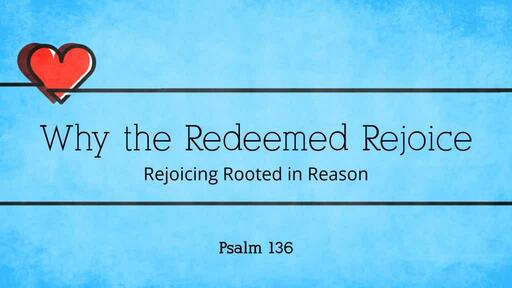Why the Redeemed Rejoice

Rejoice in the Lord always becuase His lovingkiness is everlasting.
This is an antiphonal psalm, prepared to be used by a worship leader and a choir, or a worship leader and the congregation, or perhaps two choirs. The rabbis called it “The Great Hallel” (praise). The psalm reviews God’s dealings with His people and turns history into theology and theology into worship. If our worship is not based on history—what God had done in this world—then it lacks a theological message and is not true worship at all. The refrain is a familiar one. It was sung at the dedication of Solomon’s temple (2 Chron. 7:3, 6) and also by King Jehoshaphat’s singers when Judah was attacked by Moab and Ammon (2 Chron. 20:21). (See also 106:1; 107:1; and 118:1 and 29.) The divine title “the God of heaven” (v. 26) suggests a post-exilic date, for “God of heaven” was a title used frequently in that period (Ezra 1:2; 5:11–12; 6:9–10; 7:12, 21, 23; Neh. 1:4; 2:4; Dan. 2:18, 19, 44). The focus is on giving thanks to God for who He is and what He has done for His people.
Structurally the psalm is simple. The focus is on the Lord’s continuous involvement in redemptive history, beginning with the Exodus and the Conquest. However, the Lord’s majesty and “love” (ḥeseḏ) are not to be limited to his people, as they extend to all of his creation by virtue of his being the Creator (vv. 4–9, 25).
